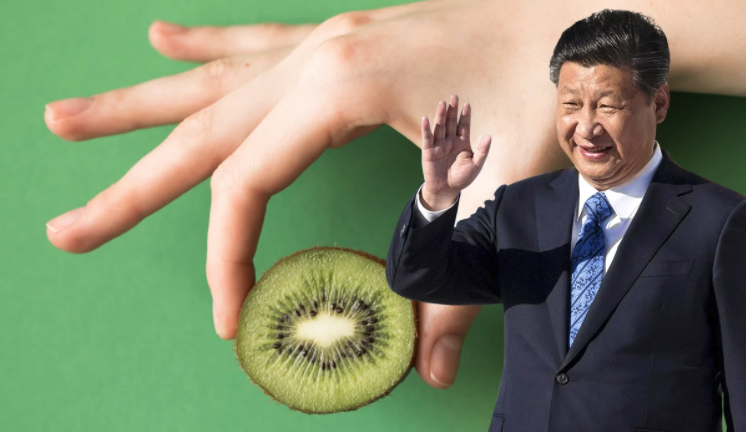I read with interest the article titled “Fruit also infected with corona? I read with great interest the article titled “New Zealand kiwi tests positive in China. It’s a kind of “dark under the lamp post,” and it’s not uncommon to learn about Japan through the foreign media, and of course there are many cases outside Japan. This case is one of the latter.

The reason why Korean newspapers picked up this topic is probably because it is a Corona case involving China and also because it is a topic in New Zealand (NZ). This is because the case of a Korean diplomat in New Zealand who sexually harassed a local employee of the same sex (called a kiwi) last year has not yet been settled.
In July last year, when President Moon Jae-in and Prime Minister Ardern had a phone conversation, Ardern asked Moon to hand over the suspect, but Moon, taken by surprise, replied blankly. I also wrote about this in my article last August. I heard that the suspect has since been transferred to the Philippines.
Some people criticized the Taiwanese authorities for double standards when they respected NZ’s argument but protested against China’s.
This is a bit of a sidetrack, but I have always felt that NZ and Taiwan have a lot in common. For example, Taiwan is an earthquake-prone island nation, has a woman in power, is controlling the spread of new coronas, and is an exporter of fruit to China.
Going back to the beginning of this story, the Global Times reported on the 24th that the city of Nantong in Jiangsu Province announced via Wichat that NZ kiwis returned to a local supermarket had tested positive for coronavirus. The local health department is trying to determine when and to whom the kiwi was sold, who the close contacts were, and has also disinfected the store.
NDA and environmental samples were collected from 14 staff members who were exposed to the kiwi and tested along with the rest of the kiwi, all of which were negative. The district health department is urging anyone who went to the supermarket or came into contact with the kiwi between the 12th and 23rd to immediately report to the health department and take the necessary control measures.
It’s a bit ridiculous, and even though it’s a state-run newspaper, it’s from China, so we can’t be sure of the truth. But the fact that it was reported is true, so it must have been done for some purpose. It may be because the Chinese government is wary of corona, or it may be to make the citizens corona-brained.
The NZ side of the story is detailed in the NZ newspaper “Stuff” on the 24th. The distributor, Zespri, responded by launching an “emergency management plan” in the afternoon of the 24th, and announced that the government was also supporting discussions with the Chinese authorities. It is the second half of the kiwi season, so the impact on exports is said to be minimal.
The batch that tested positive was shipped from the North Island port of Tauranga on August 16, the day before the last positive case in NZ. The kiwis in question were handled by a secondary distributor in the neighboring city of Hefei, according to the report.
The chief executive of the NZ Kiwi Growers Association said, “China is a very important market for NZ kiwi,” and that he was “confident that Zespri is taking this matter very seriously, reviewing its processes and working with the relevant authorities.
The deputy director general of the Ministry of Primary Industries said that “we will continue to work with the Chinese authorities on this issue,” but added in a statement that “the scientific literature and the experience of public health authorities around the world show that transmission by airborne droplets and aerosols is the primary route of Covid-19 infection.
Professor French, head of research at Massey University’s School of Veterinary Medicine, said that “coronaviruses do not survive well on surfaces, including food,” and that “otherwise there would be a large number of food- and surface-related infections,” and that “many people around the world shed the virus, so it’s not surprising that it would happen to be on some surface.
The contractors are afraid to say anything because they are customers first, but the officials and researchers are not afraid to speak their common sense. Many people would agree with Professor French’s argument. However, I wondered again why Beijing would allow a state-run newspaper to report such a false story at this time of the year.
As a result, I came to the conclusion that Beijing may be using NZ, a member of the Five Eyes, as a tool to control and disturb the public sentiment in Taiwan. Even though NZ is a member of the Five Eyes, it is well known that NZ stands apart from the other four countries in its hardline stance against China.
China is also NZ’s largest trading partner and an important export market for food producers, especially for dairy, meat, seafood and fruit. In particular, NZ kiwi accounts for a third of the world’s supply, and about 20%, or about NZ$500 million (US$360 million), is destined for China.
In November 2018, the World Economic Forum wrote that “China is the world’s largest kiwi producer and exporter,” and that “kiwis originating in China were brought across the Pacific Ocean to New Zealand in 1904. It is true that the kiwi originated in China, but the production volume in Italy and NZ must be considerable.
However, it seems that China and New Zealand are working together to improve kiwi breeding through genetic analysis and researching a disease called “Psa“. But if that is the case, don’t you think that the story of the coronavirus attachment is even more low-level?
As I wrote in my article on Taiwan’s public disturbance, China’s ban on imports of pineapples and lotus mist has divided public opinion, with some criticizing Taiwanese farmers and the Tsai administration. As I wrote in my article, China’s ban on pineapple and lotus fog imports has divided public opinion, with some criticizing Taiwanese farmers and the Tsai administration.
Beijing’s hard and soft information warfare and distraction warfare covers a wide range of topics, and it is extremely diligent. The list goes on and on, including maritime patrol ships in the Senkakus, military aircraft working diligently in Taiwan’s air defense identification zone, a large fleet of ships sitting in the Philippines’ EEZ in the South China Sea, and the constant haranguing of the countries of Northern and Eastern Europe that support Taiwan.
The list goes on and on. So, it would be easy for Japan to harass Taiwan and New Zealand to the extent that it does not cause dissatisfaction among its own farmers. As if by chance, China and Taiwan formally applied for membership in the CPTPP on the 17th and 22nd, respectively. This may be a signal to NZ, which welcomed the UK’s application to join the CPTPP in June.










Comments